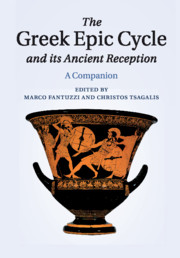Book contents
- Frontmatter
- Contents
- List of illustrations
- List of contributors
- Editorial note
- Introduction: Kyklos, the Epic Cycle and Cyclic poetry
- PART I APPROACHES TO THE EPIC CYCLE
- PART II EPICS
- 11 Theogony and Titanomachy
- 12 Oedipodea
- 13 Thebaid
- 14 Epigonoi
- 15 Alcmeonis
- 16 Cypria
- 17 Aethiopis
- 18 Ilias parva
- 19 Iliou persis
- 20 Nostoi
- 21 Telegony
- PART III THE FORTUNE OF THE EPIC CYCLE IN THE ANCIENT WORLD
- Works cited
- Index of principal passages
- Index nominum et rerum
18 - Ilias parva
from PART II - EPICS
Published online by Cambridge University Press: 05 August 2015
- Frontmatter
- Contents
- List of illustrations
- List of contributors
- Editorial note
- Introduction: Kyklos, the Epic Cycle and Cyclic poetry
- PART I APPROACHES TO THE EPIC CYCLE
- PART II EPICS
- 11 Theogony and Titanomachy
- 12 Oedipodea
- 13 Thebaid
- 14 Epigonoi
- 15 Alcmeonis
- 16 Cypria
- 17 Aethiopis
- 18 Ilias parva
- 19 Iliou persis
- 20 Nostoi
- 21 Telegony
- PART III THE FORTUNE OF THE EPIC CYCLE IN THE ANCIENT WORLD
- Works cited
- Index of principal passages
- Index nominum et rerum
Summary
Though it is the one of the best attested members of the ‘Epic Cycle’, and the only poem of that group to have taken its title from one of the Homeric epics, the Ilias parva illustrates how difficult it is to reconstruct, let alone understand, the history of Greek epic poetry after Homer.
Author – title – date
The author most widely named in modern literature, Lesches from the city of Pyrrha on Lesbos, is also the most cited figure in ancient discussions, but only from the middle of the fourth century BC; as with other ‘Cyclic’ poems, the earliest attestations take the form of ‘the one who made the Ilias parva’, while the inevitable Homeric attributions are few and late. The poem' epithet is therefore doubly surprising, for such differentiations usually qualify works by the same author, and yet the title was settled as early as Aristotle. A range of similarities with the Iliad (and Odyssey) can reasonably be invoked as the cause, as perhaps can the first word of PEG F 28 (= F 1 D. = F 1 W.), though it may not have been the poet' own choice.
The meagre linguistic evidence of the fragments does not help to determine the date of the Ilias parva, for none of those features usually judged to be ‘late’ lack some genuinely Archaic epic parallel or explanation. A post-Homeric genesis is overwhelmingly likely, tallying with the ancient chronographers and the poem' title, and modern scholars' datings therefore range rather freely between the seventh and sixth centuries BC. The earliest reliable terminus ante quem comes with its first, roughly contemporaneous quotations, (i) in Aristophanes' Knights (1056–7) of 424 BC (PEG F 2 = D. = F 2 W.) and (ii) on two potsherds (PEG F 28 = F 1 D. = F 1 W.) from the Black Sea region, one (420–410 BC) from Chersonesos and another (less precisely datable) from Olbia.9 Getting back beyond this point, as we shall see, is fraught with difficulty.
- Type
- Chapter
- Information
- The Greek Epic Cycle and its Ancient ReceptionA Companion, pp. 318 - 343Publisher: Cambridge University PressPrint publication year: 2015
- 3
- Cited by



